I thought inheriting my grandma’s house would bring me peace. Instead, it started a war, one I never saw coming. And the person who lit the match? My own cousin.
My name’s Elena. I’m 27, and I work as a freelance illustrator. I spend most of my days sketching in cafés or on my back porch, coffee in hand, and my dog curled up by my feet. It’s not a glamorous life, but it’s mine, and I’ve made peace with it.
I don’t talk much about my family. Mostly because there’s not much left of it.
My mom died in a car accident when I was six. After that, my entire world shifted. While other kids were learning how to ride bikes with their dads or going on family vacations, I was packing up my things and moving into a small cottage with my grandmother, Lily. I always called her Gran.

An elderly woman with her granddaughter | Source: Pexels
Gran was everything. She had this soft voice that could calm a storm, and she made the best cinnamon rolls you’d ever taste. She was stubborn, funny, warm, and sharp as a tack even in her late 70s.
She filled the silence in our house with humming, always some old tune neither of us knew the name of.
It was her and me, through everything.
After Mom passed, my dad pretty much disappeared. I don’t even know where he is now. Gran never said a bad word about him. She just shook her head and called him “a runner.”

A man walking away | Source: Pexels
Gran’s other daughter, my aunt Greta, lived in the next town over. She had a daughter, too, my cousin Lydia, who was just a year older than me. We were never close. Lydia always acted like anything that didn’t directly benefit her was a waste of time. She kept her nails perfectly done, walked around with her nose in the air, and carried that look like the world owed her something.
They showed up for Christmas once in a while, sometimes on Easter, but they never stayed long. They didn’t call. They didn’t help when Gran was sick or needed a ride to the doctor. It was always me. Only me.
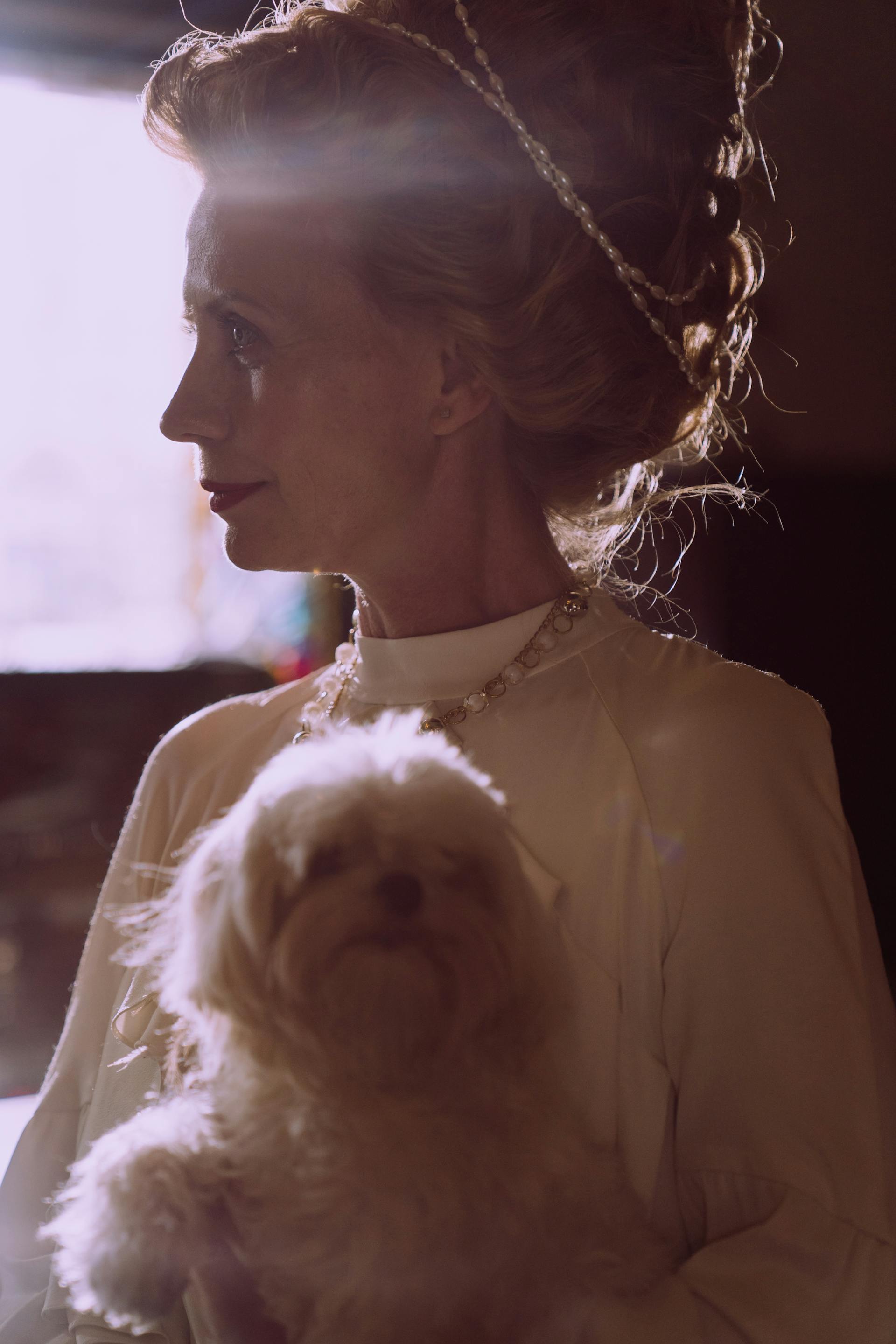
A middle-aged woman holding a dog | Source: Pexels
When Gran passed away last spring, I didn’t cry at the funeral. I didn’t need to. I’d already cried all the tears I had during her final weeks in hospice. When the lawyer handed me the will and I saw that she’d left me the house, I didn’t feel shocked. Just a quiet kind of heartbreak. The kind that lingers.
The house wasn’t big, just a modest two-bedroom cottage with chipped white paint and a creaky porch swing. But it was filled with her, with the scent of baked apples and lavender oil, the worn-out crochet blanket she used to wrap around both of us during thunderstorms, and the faded photos of my mom in her prom dress on the mantel.
That house was her heart. And it had become mine too.

The front door of a house | Source: Pexels
*****
It was a gray Tuesday, with heavy clouds hanging low in the sky when my phone buzzed. It was Lydia.
I stared at the screen for a moment, surprised. I hadn’t heard from her in months. Aside from a few tense words at Gran’s funeral, we hadn’t spoken at all.
I answered cautiously. “Hello?”
“Hey,” she said quickly, not bothering with small talk. “I need a favor. I think Grandma was keeping a packet of my documents at her house. They’re really important and I need to get them.”
I blinked, confused. “What kind of documents?”
“Just… papers. Birth stuff, school stuff. I don’t know. Can I come by and get them?”
I paused. “Can it wait a couple of days? I’ve got a work trip tomorrow. I’ll be back Thursday.”

A woman packing her clothes | Source: Pexels
“No, it can’t wait,” she snapped. “Please, just leave me the keys. I’ll be quick, I swear.”
Something about her tone made me pause. Lydia never asked for anything without an edge. Still, she was family.
I sighed. “Fine. I’ll leave them under the doormat.”
“Thanks,” she said, and the call ended. No goodbye.
*****
I was gone for one night.
When I got back, the house looked the same from the outside. The porch was untouched, and the flower pots were still sitting crooked, just as I had left them. For a moment, I wondered if I had simply been paranoid.
Then I opened the door.
The silence inside felt heavier than usual, like the house already knew something was wrong.
The smell hit me first: sour milk and something rotten. My stomach turned. I stepped inside slowly, my heart pounding.

A woman wearing a collared shirt | Source: Pexels
The living room looked like the aftermath of a frat party. Fast-food wrappers were scattered everywhere. Greasy containers lay open, with half-eaten burgers still dripping sauce. Soda cans were tossed across the floor, and someone had stomped chips into the carpet, grinding them into crumbs.
My breath caught. I dropped my bag and walked down the hall, past the kitchen, toward the room I hadn’t touched since Gran died, her bedroom.
I opened the door, and my knees almost gave out.
There was red and black paint smeared across the wallpaper, crude and angry. The bed was shredded — actual feathers floating in the air. Greasy handprints streaked the closet. Candy wrappers and takeout bags spilled from the drawers.
It wasn’t just a mess. It was deliberate destruction.
I stared at the room, heart racing, then pulled out my phone and called her.

A close-up shot of a woman holding a phone | Source: Pexels
Lydia picked up immediately.
“What did you do?!” I choked out. “Why would you trash the house? And Grandma’s room? How could you?”
There was a long silence. Then she spoke, her voice cold.
“Oh, don’t act so innocent. You know exactly why. Grandma left the house to you. It should have been mine. You don’t deserve it.”
My grip on the phone tightened. “You barely even visited her! You never helped. You weren’t there.”
Her laugh was sharp. “Doesn’t matter. You got what I wanted. So I made sure you wouldn’t enjoy it.”
Then she hung up.

A close-up shot of a woman talking on her phone | Source: Pexels
I stood there for a long time, phone still to my ear, listening to the dead line.
The room was silent except for the soft rustle of feathers drifting to the floor.
She had done this out of pure spite. It was never about the documents. It was a statement. A warning.
And as I looked around the room, at the remnants of the woman who raised me, something in me shifted.
I wanted to collapse, but instead I rolled up my sleeves.
The next morning, I woke up sore, angry, and still shaken. But the moment I stepped into the hallway and smelled that awful mix of grease, rotting food, and cheap perfume, I knew what I had to do.

A woman rolling up the sleeves of her shirt | Source: Pexels
The first stop was the hardware store. I loaded up my cart with buckets, sponges, bleach, gloves, heavy-duty trash bags, and enough lemon-scented cleaner to scrub a whole motel. The cashier raised her eyebrows at my pile.
“Big mess to clean?” she asked, casually.
I just smiled tightly. “Something like that.”
Back home, I tied my hair up, pulled on old jeans, and started with the living room. The stench hit me in the face again, stronger now that the windows had stayed shut overnight. I gagged but pushed through it, slipping on gloves and dropping to my knees.
I scrubbed the floors until my arms ached, but some of the stains had already sunk deep into the wood. I muttered curses under my breath as I sprayed, wiped, and hauled bag after bag of garbage to the curb.
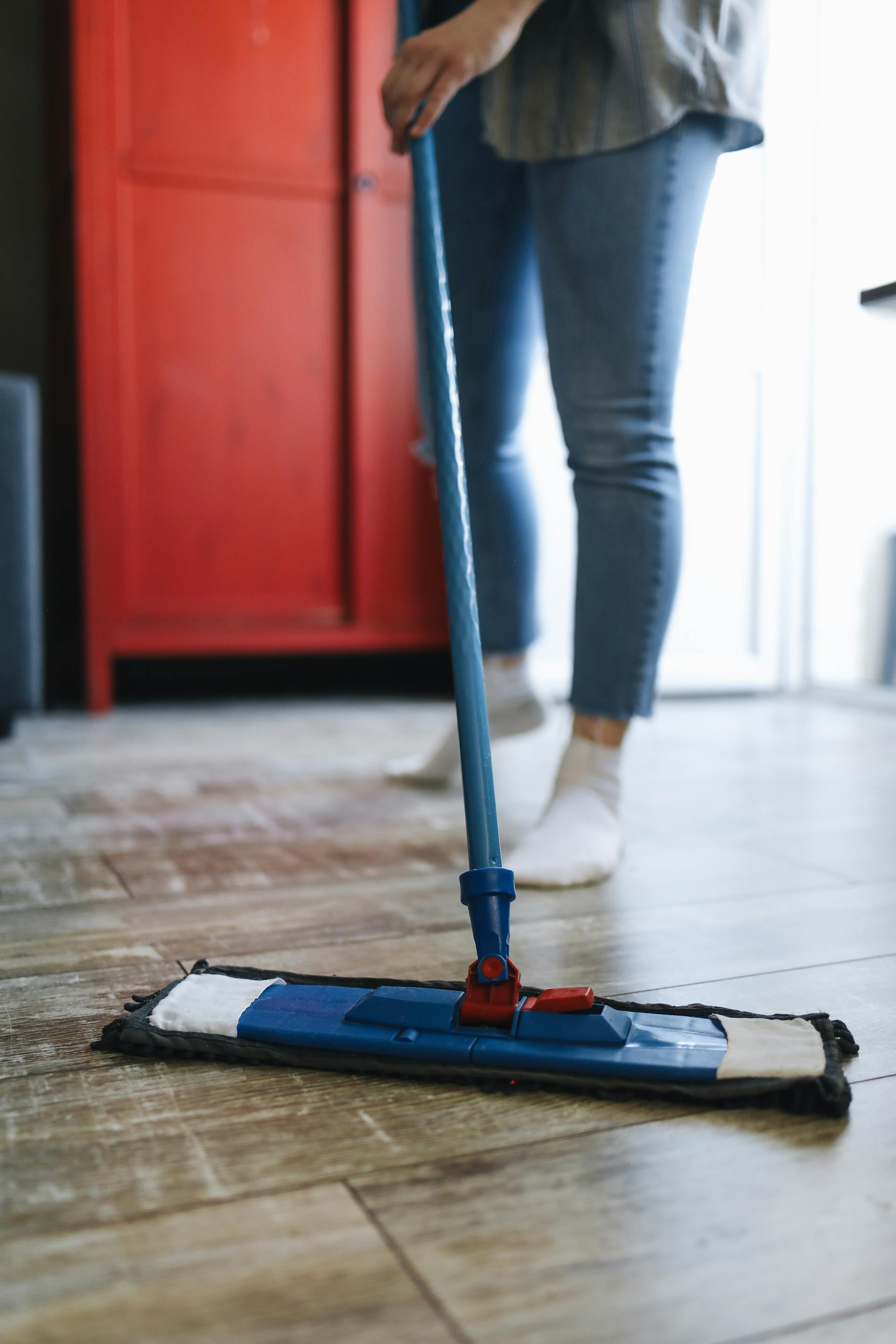
A close-up shot of a person cleaning the floor with a mop | Source: Pexels
No matter how many times I washed my hands, the smell clung to my skin. It followed me into the shower, and even into my sleep.
By the third day, I realized I couldn’t do it alone. The paint Lydia had smeared across Gran’s bedroom walls wouldn’t come off, no matter how hard I scrubbed. I tried everything — vinegar, baking soda, even online cleaning hacks from random YouTube moms. Nothing worked. The black and red streaks just smeared deeper, like open wounds on the wallpaper.
That room, her room, hurt the most.
I finally gave up and called in painters. Two middle-aged guys named Rick and Brian showed up the next morning. They didn’t ask questions when I pointed to the bedroom.
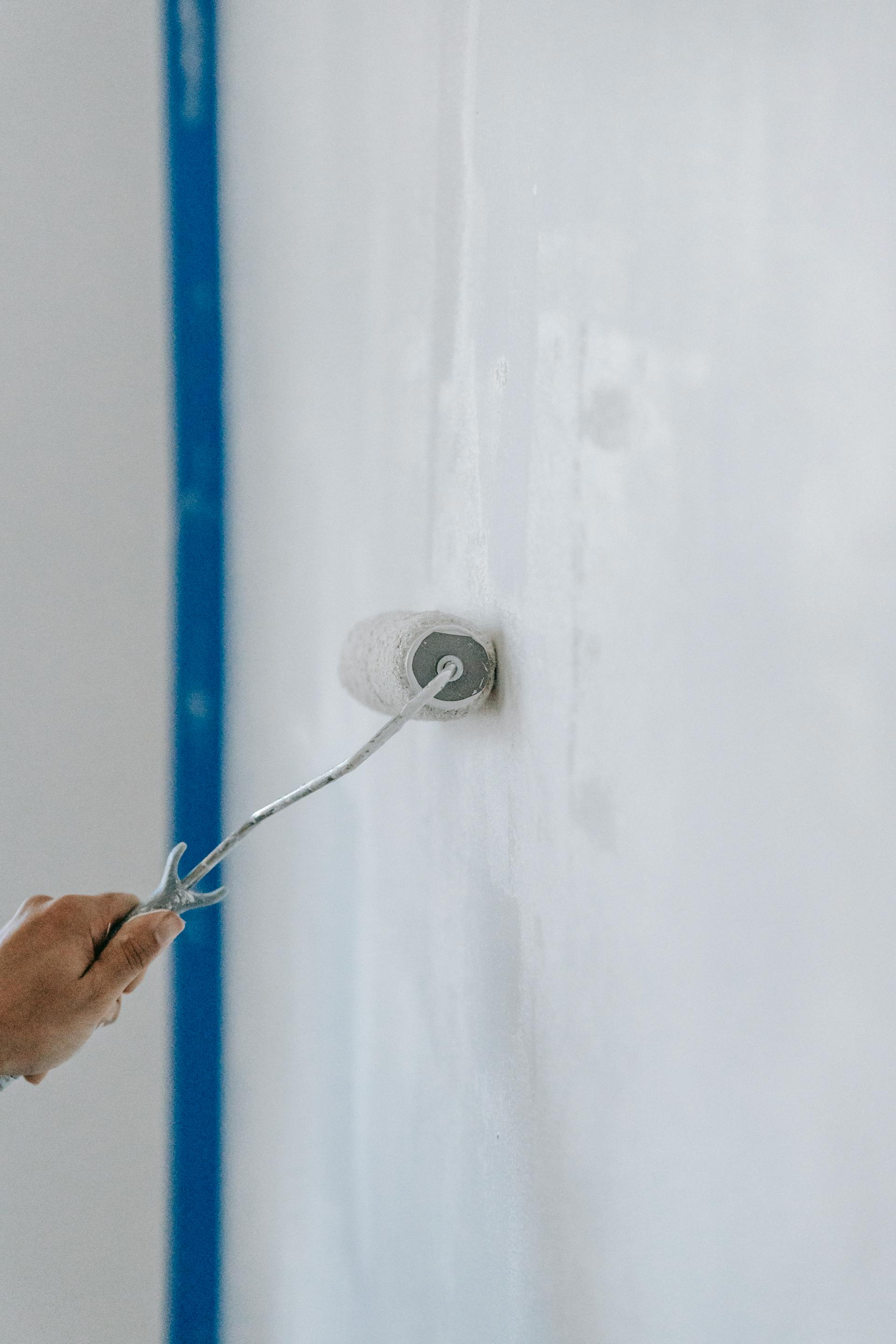
A person painting the wall with a roller | Source: Pexels
“You sure this isn’t, like, a prank war gone too far?” Rick asked as he studied the paint damage.
“No. Just someone with no respect for the dead,” I replied, my voice tight.
They didn’t say anything after that. Just nodded and got to work. It cost me almost five hundred dollars I hadn’t planned to spend, but when I walked into the room two days later and saw the clean, pale walls again, I almost cried.
I tossed the ruined pillows and bedding. There was no saving them. They smelled like stale fries and old cologne. I bought new sheets, fluffed new pillows, and laid a soft, fresh blanket across the bed. But every time I smoothed it out, my mind flashed back to Gran’s hands: steady, careful, and warm.
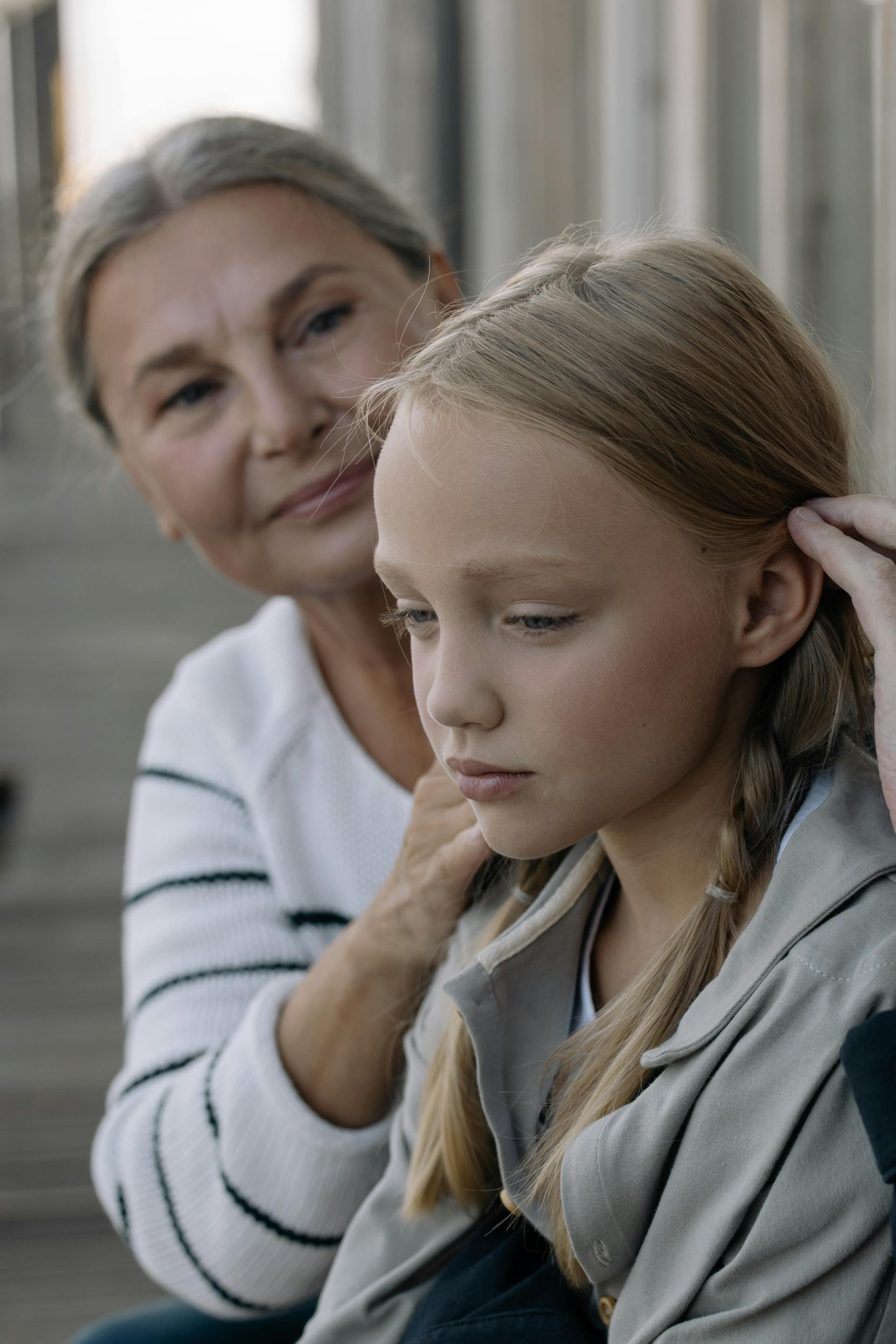
A grandmother taking care of her granddaughter | Source: Pexels
The house had stopped smelling like her. That’s what broke me most.
The living room took even longer. I rented a carpet cleaner that sounded like a small jet engine and pushed it back and forth for hours. I scraped hardened cheese off the armrest of Gran’s old recliner. I cried when I realized the couch couldn’t be saved.
I borrowed my friend Kayla’s truck, loaded the furniture, and hauled it to the dump by myself. A guy working there helped me unload it, grunting as he heaved the stained recliner onto the pile.
“Looks like this thing’s been through a war,” he muttered.

A grayscale photo of a smiling man | Source: Pexels
I nodded. “You don’t know half of it.”
A few days later, I picked out new furniture. Just simple pieces. A beige loveseat, a small coffee table, and a plush chair that reminded me a little of Gran’s old one. I set everything up and stepped back to admire the space. It looked right. It looked clean. But I still wasn’t at peace.
Because underneath it all, Lydia’s words still echoed in my head. “It should have been mine.”
And I realized she thought this was over.
She thought she could come in, destroy what she didn’t get, and just walk away.
That’s when I knew what I had to do next.
I didn’t say a word to Lydia after that phone call. I didn’t confront her. I didn’t try to reason with her. I knew she’d only spin it into something ugly.
So instead, I called a lawyer. A no-nonsense woman named Michelle who had sharp eyes and a tone that told me she’d seen far worse cases.
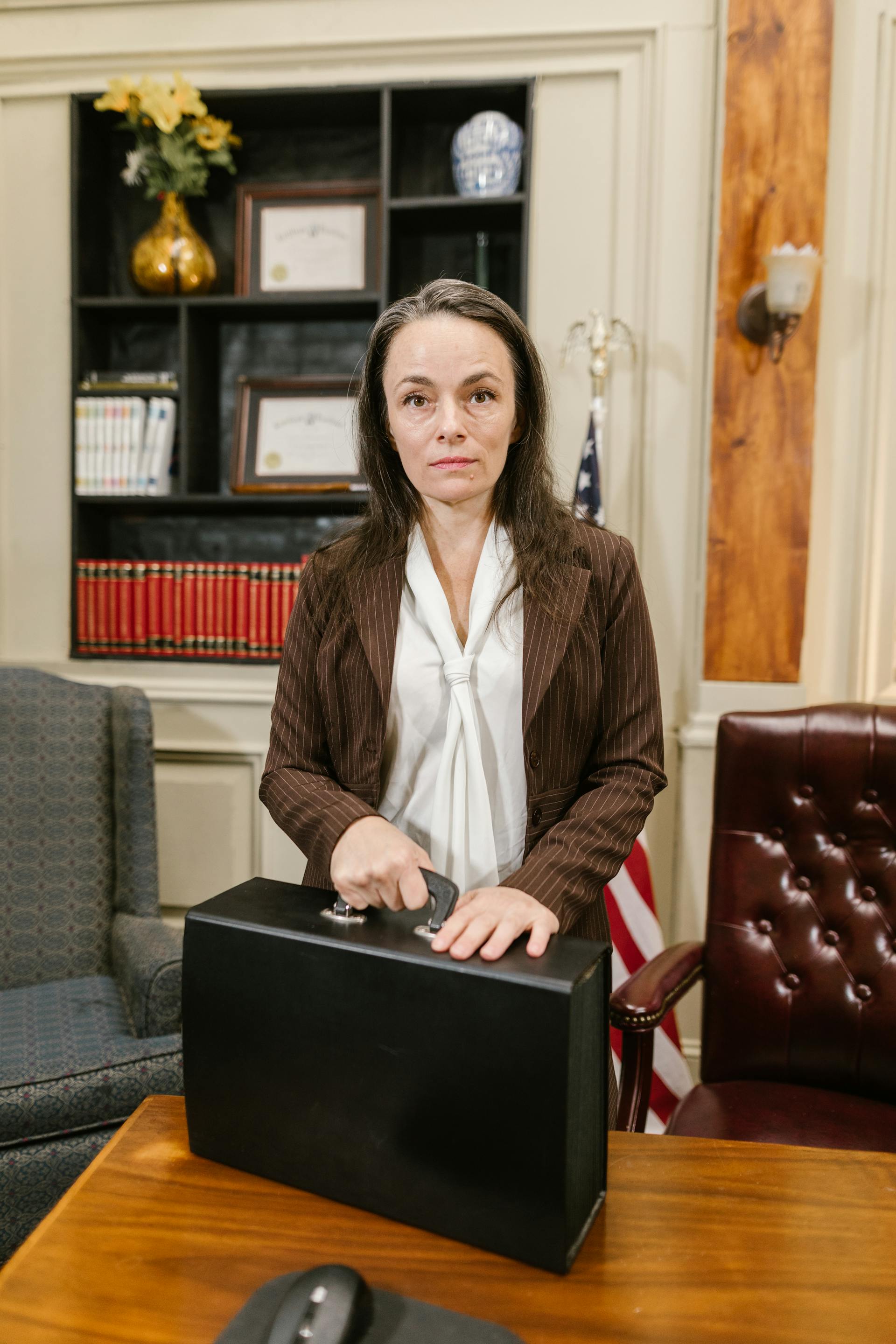
A woman in a brown blazer holding a black briefcase | Source: Pexels
After I explained everything, I pulled out my phone and showed her the photos: the trashed furniture, the paint-smudged bedroom, and the piles of garbage. I handed over every receipt I had, including the ones for cleaning supplies, painters, and the furniture store.
Michelle flipped through the papers slowly, then looked up.
“This is solid,” she said. “She won’t walk away from this.”
“Even if she says it’s not her fault?” I asked.
“We have photos, texts, and a motive. We’ll make it stick.”
It took a few weeks, but eventually I got the call. The court had ruled in my favor. Lydia was legally responsible for the damage. She had to reimburse me for every single penny I’d spent fixing Gran’s house.

A close-up shot of a wooden gavel | Source: Pexels
That was the moment I smiled. For the first time since this mess began.
But I didn’t want to just send her the ruling. That would be too easy. I wanted her to feel the weight of what she did. I wanted her to see it, to know this was her mess — and she was going to own it.
I bought a plain cardboard box and slid the court papers inside a large envelope. I tucked in copies of the receipts, too. Then I tied the box with a bright pink ribbon and taped a little card to the top.
“From the home you destroyed.”
I drove to her house one evening just before sunset. She wasn’t home; her car wasn’t in the driveway. I placed the box gently on her porch, right in front of the door, and walked away.

A close-up shot of a person holding a gift box with a pink ribbon | Source: Pexels
I wasn’t even ten minutes down the road when my phone rang.
I picked up, calm as ever.
“WHAT THE HELL IS THIS?!” Lydia shrieked. Her voice pierced through the speaker.
I didn’t even flinch.
“That’s a court order,” I said. “You’re legally responsible for the damage you caused. You’re going to pay for every bag of trash I hauled out, every wall I repainted, every pillow you ripped open. All of it.”
“You’re insane!” she snapped. “You actually went to court over this?!”
“Yes, I did.”
She cursed loudly, rattling off threats, calling me dramatic and obsessed.
“You think you’ve won?” she spat.

A woman yells while holding a telephone set | Source: Pexels
I paused for a moment, then answered softly.
“No. Grandma won. Because in the end, you didn’t take her house from me. And now you’ll pay for trying.”
Before she could respond, I hung up.
Weeks passed. Lydia tried to appeal, but she failed. The judgment stood, and the payments started showing up in small checks, never early and always signed with a sarcastic note like “Enjoy, Princess.” I didn’t care. I cashed them anyway.
Each envelope felt like a reminder that she had lost, even if she refused to admit it.

A person holding a bank check | Source: Pexels
Meanwhile, I finally began to breathe again.
The house no longer felt violated. It felt steady and peaceful.
Some nights, I’d sit in the living room with a cup of tea, the lights dim, the TV off. I’d run my hand over the armrest of the new chair and listen to the stillness. It wasn’t the same. It never would be. But it was mine. And it was safe.
Sometimes, I would walk into Gran’s room, sit on the edge of the bed, and talk out loud in just a whisper.
“Got her back, Gran,” I’d say. “She didn’t get to win.”

A woman smiling | Source: Pexels
One day, I opened the bottom drawer of her old desk. I placed the framed court ruling beside her favorite Bible and the photo of her holding my mom’s hands, both of them smiling on my mom’s wedding day.
It felt like putting something broken back where it belonged.
I didn’t need to gloat. I didn’t need to tell anyone what I’d done. But that ruling reminded me of something important — something Gran had always told me: “You’re stronger than you think, Elena.”
And for the first time in a long while, I believed it.

A happy woman sitting outdoors | Source: Pexels
Do you think I did the right thing? What would you have done if you were in my shoes?
If you enjoyed reading this story, here’s another one for you: When Eleanor is abandoned by the church she served for nearly 50 years, her silence speaks louder than any sermon. As her granddaughter watches heartbreak turn into clarity, one final act of truth is set in motion. This is an unforgettable story of legacy, faith, and the quiet power of not being forgotten.
This work is inspired by real events and people, but it has been fictionalized for creative purposes. Names, characters, and details have been changed to protect privacy and enhance the narrative. Any resemblance to actual persons, living or dead, or actual events is purely coincidental and not intended by the author.
The author and publisher make no claims to the accuracy of events or the portrayal of characters and are not liable for any misinterpretation. This story is provided “as is,” and any opinions expressed are those of the characters and do not reflect the views of the author or publisher.



